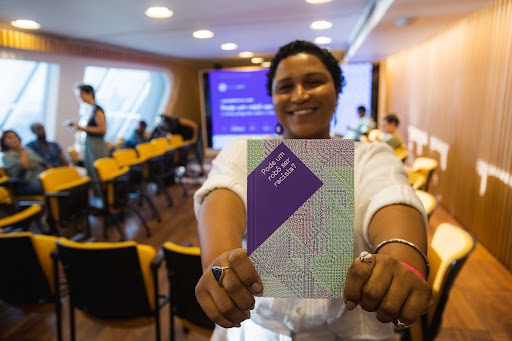CAN A ROBOT BE RACIST?
The first volume, titled "Can a Robot Be Racist? and Other Questions About the Future of Technology," features five fascinating articles on the importance of technology in today's world and its decisive role in the future. Guest editor Silvana Bahia, co-director of Olabi and coordinator of Preta-Lab, leads this volume
In this volume, Silvana and four other authors, members of the museum's Scientific and Knowledge Committee, explore the relationship between technology and society from different perspectives. They highlight how technology is a product of society and carries with it its marks, biases, and prejudices. Using everyday examples, such as social media, apps, and documents
The authors emphasize the importance of democratizing not only access to technology, but also its development. This democratization is essential to prevent the reproduction of past and present inequalities in the future
Read the publication here:
Pensando Amanhães - Pode Um Robô Ser Racista_Vol1.pdf
CAN CAPITALISM BE SUSTAINABLE?
The second volume raises a provocative question that serves as a starting point for important reflections: "Can Capitalism Be Sustainable?" Through five articles by experts, we engage in discussions on sustainability, diversity, inclusion, and the role of businesses in sustainable development. We invite collective reflection and propose an open and accessible dialogue on critical issues that will define the coming decades
The publication features Fábio Scarano, current curator of the Museu do Amanhã and holder of the UNESCO Chair in Literacy for Futures — a partnership with UFRJ - Federal University of Rio de Janeiro, as guest editor; and authors Andreza Maia, specialist in diversity and inclusion and co-founder of the Possible Futures observatory; Anna Carolina Fornero Aguiar, biologist and researcher at the UNESCO Chair in Literacy for Futures; Paulo Durval Branco, deputy director of the International Institute for Sustainability (IIS); and Beatriz Carneiro, doctoral candidate in Environmental Sciences and Conservation and also researcher at the UNESCO Chair in Literacy for Futures
Read the publication here:
Pensando Amanhães - Pode o Capitalismo Ser Sustentável_Vol.2.pdf
IS LIVING MORE LIVING BETTER?
The third volume and most recent release of the collection asks us: “Is living longer living better?” Or, does longevity go hand in hand with the idea of quality of life?
In this publication, editor Hugo Aguilaniu—a neuroscientist and member of the Museu do Amanhã Scientific and Knowledge Committee—presents an article reflecting on how the quest for life extension is a long-standing theme for human beings, yet still based on a distant notion of what longevity can truly be, combined with other life factors. Hugo invites Mychael Lourenço, neuroscientist and professor at the Institute of Medical Biochemistry at UFRJ; Dani Balbi, ESPM professor, screenwriter, and the first transgender woman to serve as a state representative in Alerj; Alexandre Kalache, physician, gerontologist, and president of the International Center for Longevity Brazil; and Geni Núñez, Guarani Indigenous activist, psychologist, and writer, to participate in the publication
Read the publication:
Pensando Amanhães - Viver Mais É Viver Melhor_Vol.3.pdf
DOES DREAMING TRANSFORM THE WORLD?
And other questions about the future of dreams
The fourth and most recent volume in the series presents a multifaceted investigation into the role of dreams, approaching the topic from different perspectives that connect philosophy, science, and culture. The edition reflects on how dreams can guide worldviews in indigenous and quilombola groups, highlighting their importance in the collective construction of identities and futures. The relationship between dreaming and quality of life is also discussed, with a focus on the impacts of dreams on health and well-being, among other areas of discussion involving dreams as forms of self-knowledge and tools for guiding important decisions. It also reflects on the nature of dreams as individual desires and their potential to foster utopias and collective visions
With this diversity of perspectives, the edition seeks to provoke reflections on the role of dreams in personal and social transformation, broadening horizons to consider possible futures.
Read the publication:
Pensando Amanhães - Sonhar Transforma o Mundo_Vol.4.pdf
Available for purchase! Visit the Museum of Tomorrow store to purchase your physical copy of the Thinking Tomorrows publications. Find us at the main entrance, on the left. Secure your copy and support this essential guide to understanding the challenges and opportunities that await us. Join us in the search for solutions and inspiration to build a sustainable and inclusive future for all



